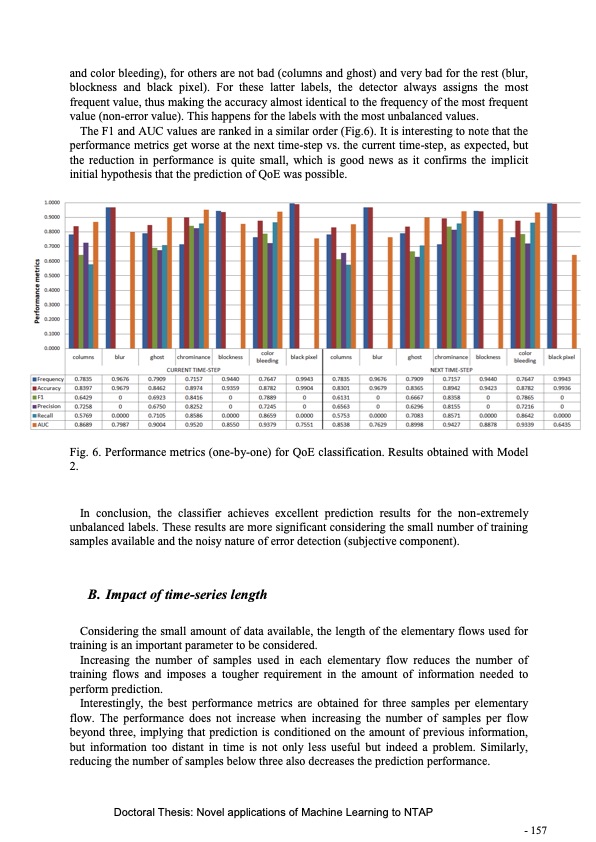
PDF Publication Title:
Text from PDF Page: 159
and color bleeding), for others are not bad (columns and ghost) and very bad for the rest (blur, blockness and black pixel). For these latter labels, the detector always assigns the most frequent value, thus making the accuracy almost identical to the frequency of the most frequent value (non-error value). This happens for the labels with the most unbalanced values. The F1 and AUC values are ranked in a similar order (Fig.6). It is interesting to note that the performance metrics get worse at the next time-step vs. the current time-step, as expected, but the reduction in performance is quite small, which is good news as it confirms the implicit initial hypothesis that the prediction of QoE was possible. Fig. 6. Performance metrics (one-by-one) for QoE classification. Results obtained with Model 2. In conclusion, the classifier achieves excellent prediction results for the non-extremely unbalanced labels. These results are more significant considering the small number of training samples available and the noisy nature of error detection (subjective component). B. Impact of time-series length Considering the small amount of data available, the length of the elementary flows used for training is an important parameter to be considered. Increasing the number of samples used in each elementary flow reduces the number of training flows and imposes a tougher requirement in the amount of information needed to perform prediction. Interestingly, the best performance metrics are obtained for three samples per elementary flow. The performance does not increase when increasing the number of samples per flow beyond three, implying that prediction is conditioned on the amount of previous information, but information too distant in time is not only less useful but indeed a problem. Similarly, reducing the number of samples below three also decreases the prediction performance. Doctoral Thesis: Novel applications of Machine Learning to NTAP - 157PDF Image | Novel applications of Machine Learning to Network Traffic Analysis

PDF Search Title:
Novel applications of Machine Learning to Network Traffic AnalysisOriginal File Name Searched:
456453_1175348.pdfDIY PDF Search: Google It | Yahoo | Bing
Cruise Ship Reviews | Luxury Resort | Jet | Yacht | and Travel Tech More Info
Cruising Review Topics and Articles More Info
Software based on Filemaker for the travel industry More Info
The Burgenstock Resort: Reviews on CruisingReview website... More Info
Resort Reviews: World Class resorts... More Info
The Riffelalp Resort: Reviews on CruisingReview website... More Info
| CONTACT TEL: 608-238-6001 Email: greg@cruisingreview.com | RSS | AMP |